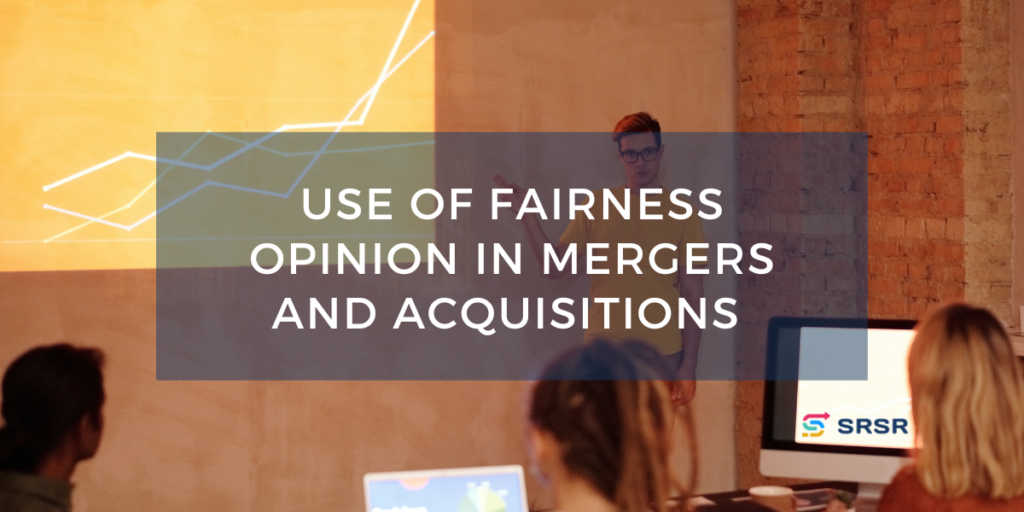If you’re currently undergoing a merger, you might have heard you need to get an opinion of value or a fairness opinion. This guide has all the details you need to know so that you can be sure the merger and acquisition (M&A) goes smoothly.
The following article covers what a fairness opinion is, how to choose an expert advisor, and how to present a fairness opinion to a board of shareholders.
With the analysis of a fairness opinion, you can expect financial advice on the fairness of offers and transactions pertaining to the business.
What is a fairness opinion?
While undergoing a merger or acquisition, you will always receive a fairness opinion. These should only be done by investment bankers or an advisor that is qualified and experienced. This person will decide if the offer is fair or not when it comes to the price offered by the buyer. It will also evaluate the fairness of the price in terms of the shareholders.
Fairness opinions are used in all mergers, whether they are mutual or hostile. So anytime a merger is happening, don’t be surprised when someone brings up the topic of a fairness opinion.
The only difference is that during mutual mergers, the price is usually considered fair. When the merger is hostile, many shareholders often do not want to accept the price. Hence, they might try to change the terms in something that is in their favor.
Fairness opinions in mergers and acquisitions
Fairness opinions regarding the M&A context are about the same as fairness opinions for other industries or instances. In a merger, the seller’s investment banker will take a fairness opinion showing the fairness of the transaction to the directors. Thus, they can see all the financial parts of the transaction to decide if they agree with it or not.
The purpose is to try to show the selling shareholders the deal’s fairness. Hence, they can determine if they agree with the merger.
Sometimes, the interests of the shareholders are not the same as the interests that management might have. For example, the management team might have one bidder they prefer and want to give the merger over to. In turn, the shareholders could think that the management wants to choose one company over another. This is because they are gaining something financially from them.
Fairness opinions are meant to protect both the shareholders and management. For instance, any situation that could cause them to turn hostile or any situation where they could start blaming one another. This also protects both parties from shareholder lawsuits which could take away a lot of time and money from everyone.
The importance of unbiased analysis
Most of the time, shareholders do not usually oppose a fairness opinion. They rarely go against management unless the merger is a complete surprise. If conditions are already hostile, the merger could also turn hostile since tension and stress are already present.
Whether the transaction is mutual or hostile, you need to make sure you always get an unbiased analysis to avoid problems in the future. If you have an unbiased opinion, everyone is more willing to agree and want to work together.

Here are the main ways you can ensure you get an unbiased opinion and the advisor you are working with is fair and reputable:
- Get an opinion from independent investment bankers. So that they are not already providing financial information to someone engaging with one side or the other.
- Talk to shareholders and the other side to choose a financial advisor together.
- If there is a potential conflict of interest, be upfront about it. Talk about it so that everyone can see if they are on the same page.
Why is the use of opinions of value important?
The opinions of value are important for a few different reasons. Part of this is what is known as the business judgment rule. This rule states that the management of a business has a responsibility to shareholders to represent them in fairness and kindness when it comes to things like merging.
Shareholders do not usually take place in day-to-day business transactions. This means the directors are responsible for looking out for the shareholder and ensuring sound business transactions. So, a fairness opinion helps to show shareholders that all offers on a business are fair. Moreover, show that the shareholders are thought about and represented.
- Without a fairness opinion, shareholders might feel like there are transactions or other things going on in the business that they don’t know about.
- A fairness opinion helps to alleviate any issues that people might have about the price of the offer.
- A fairness opinion shows good faith in all transactions. This helps to limit fights and disagreements when it comes to mergers.
- Independent advisors do not take sides so people can feel like they are heard and that everyone is on the same page.
More information about the use of fairness opinions
Not sure if you want to get a fairness opinion? The above list summarizes the main reasons why people get a fairness opinion in an effort to make all mergers and transactions smooth. Here is some additional detail about why you always need to get a fairness opinion.
More information
Shareholders and management teams deserve to have all the information in front of them before agreeing to a merger. When they can look at a detailed analysis, they can see all the needed financial information and make informed decisions. If they do not understand the worth of business transactions, they can take a closer look with the advisor and have everything explained to them.
Less chance of a dispute
With all mergers, there is a chance of disputes happening from time to time. When both parties are presented with fair knowledge, there is less of a chance of them fighting with one another. They can also make well-informed decisions, and it gives them an open place to negotiate.
Better assessment
There are often many different alternatives that someone can choose for their merger. So people want to be able to view all the alternatives before they close the deal. This process can often take a lot of time because the shareholders and management want to negotiate and see where they can get the best deal that will benefit them financially. Fairness opinions help to show an assessment of all the different options so that people can make informed choices without feeling pressured to choose one over another.
Boost of confidence
When you have a fairness opinion, both sides have done their part to ensure transactions are fair, so you can present the deal better and more easily convince others that it is equitable. You can also use it during future negotiations if someone complains that the merger did not go well or went in the wrong direction.
Protection from lawsuits
When an expert advisor can give an unbiased and fair opinion, shareholders are more likely to accept the deal. When there is not a fairness opinion, shareholders might be taken aback or offended by the offer. This opens the door for lawsuits that can be devastating for the company and its finances.
Issues with fairness opinions
While fairness opinions are almost always a good thing, issues with them can arise from time to time. Here are things to consider before getting a fairness opinion.
- Cost. Investment advisors can charge a hefty sum, and you are in charge of paying it. Make sure the business can cover this fee and that it will not cause setbacks.
- Time. Advisors are often under a lot of pressure to get the fairness opinion done in a short amount of time because it needs to be done during negotiations. This can cause the offer and decisions to be rushed. This also causes the price to be higher because advisors demand premium fees when they are forced to work under pressure.
- Courts. Fairness options often have to be reviewed in court. This means the advisor needs to be very experienced. They also have to know what documents and details to bring to court to ensure the entire process is smooth.
- Fairness. While a third party usually does the opinions, sometimes the investment bank that does them might also be involved in the merger. This conflict of interest can make many people critical of the deal.
When does a person or company need a fairness opinion?
You need a fairness opinion for all significant transactions that take place during an acquisition or merger. Getting a fairness opinion is crucial for any merger to go well because shareholders need to know the current value of the company and if everything is being managed properly when the business is handed over to another company.
While the main purpose of a fairness opinion during a merger is to ensure that the offer is fair with the business being handed over, there are many other times you will want to get a fairness opinion including:
- All transactions related to a merger
- All material transactions
- Transactions that do not involve cash, including stocks, options, earnouts, and financing for the seller
- Cross-border transactions
- Any deals that involve synergies
- Any transaction that could change the status of a not-for-profit business
- Transactions in the early development stage or when a business is going to a different industry
Guidelines for the fairness opinion process
If you are in the middle of a merger or acquisition and ready to begin the fairness opinion process, here are some guidelines and tips to follow.
Selecting a third party
You should always choose a third party that is professional and reputable. Always select an advisor or bank not involved in the merger so there is no bias or conflict of interest. This is also important when it comes to the way the financial process works and how everyone is paid. When you are using someone involved in the merger, there is usually an advisor fee that must be paid when the offer is successful.
Third parties are paid regardless of whether the fairness opinion is considered successful or not. This allows everyone to trust the opinion more because they know the advisor is focused more on the fairness of the situation rather than being overly concerned about certain people getting money.
Choose your timing wisely
Before the agreement of acquisition takes place, you need to be able to present a fairness opinion. The fairness opinion only works on this day and has to be redone if another agreement is brought forth.
This means you need to ensure you are not delaying getting the opinion. Sometimes there can be delays that are out of your control, so make sure you hire the advisor and begin all the necessary paperwork well before you need the decision.
In certain cases, there can be a big difference between when the shareholders are voting and when the opinion is given. If the time is significant, you might need to ask the advisor to give a “bring down” opinion. These are not common since the market can change and affect the overall opinion, but you will want to consider whether it’s necessary for your merger.
Cost versus the value of the opinion
As with all business decisions, the cost of the fairness opinion versus the value you get from the opinion is something to consider. You need to make sure you are getting what you pay for.
This means you need to look for an experienced advisor that is specifically experienced in the field that you work in. So, if you are working in the restaurant industry and two restaurants are merging, you need to find an advisor that has experience working with restaurant mergers.
If the fairness opinion is being fought or there are people telling you that the opinion is not valid, it’s worth it to have an experienced advisor that can meet with the shareholders and board members to explain how the decision was reached and how they made the decision.
The expertise of the advisor doesn’t only benefit you. It also benefits the shareholders because it shows that you are willing and want everyone to agree and be on the same page. It’s a good business decision in general for all parties involved.
Questions to ask the financial advisor about opinion values

If it’s your first time working with a financial advisor regarding opinion values and fairness opinions, you need to ensure you are asking the right questions to get a feel for their expertise. Any professional with the right experience should be able to give you easy answers to the following questions:
- Will the transaction be able to create or destroy shareholder value as the merger or acquisition takes place?
- How will you determine the value of the equity interests and target assets?
- Are there any noncash considerations that can change the transaction value? What about things like options, earnouts, seller notes, and equity?
- Will the transaction be accretive or dilutive?
- Are there other things that can affect the value of the transaction, such as risks, growth opportunities, and synergies?
- What about tax contingencies and attributes that can change the value of the deal?
How does the advisor make the valuation?
An expert advisor takes many steps when looking at a company and determining the option value. They use many mathematical models and equations. They also analyze many financial aspects of the businesses. You will see them doing many calculations that need to be checked and double-checked.
Once they have all the numbers and calculations they need, they will sit down and make an official document that can be presented as the fairness opinion. You can then take this document to the shareholders and management team.
Summary of the use of opinions of value in mergers
Mergers and acquisitions can often be stressful for everyone involved. They can change many lives and jobs. To take some of the stress off of this changing time in your business, start working on a fairness opinion as soon as possible. Using this guide, you can make it more likely that the merger and all transactions are fair and everyone agrees.

